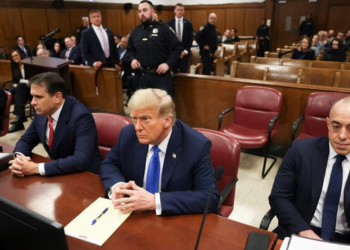
The resurrection of Jesus is the foundation of the Christian faith, but a significant portion of those who celebrate it on Easter do not believe it to be true.
Last year, Lifeway Research reported that 23% of American adults said the Bible’s account of Jesus’ rising from the dead is not accurate, and a Whitestone Insight survey of people in Britain showed 25% of self-identified Christians saying the resurrection is “a myth.”
What’s more, even the word “resurrection” is problematic for some. A copywriter for a North Carolina megachurch last month said she would tailor the church’s Easter messages for nonbelievers by omitting words like “resurrection” that could “make someone feel like an outsider.”
But theological researchers and experts say those perspectives obscure the true meaning of the resurrection and of Easter.
“The thought of a ripe corpse decaying [and] coming back from the dead was grotesque to the Roman mind,” Jeremiah Johnston, apologetics pastor at Prestonwood Baptist Church in Plano, Texas, said in a telephone interview. “And yet Christianity takes something that is grotesque and — as only God can do — makes it beautiful.”
“That message of resurrection took hold so much so that Christians began to realize every shred of evidence for Jesus’s resurrection was evidence for their own future resurrection. … It made the Gospel irresistible to the Roman Empire; as much as they didn’t want to accept it, they had to,” he added.
Mr. Johnston said that filming videos inside the Aedicule of the Church of the Holy Sepulchre in Jerusalem last year for his “Body of Proof” Bible study and video series further cemented his belief.
“I filmed next to the place where I believe with all my heart, based on the evidence, Jesus’ body was resurrected from the dead, and I get shivers and goosebumps when I watch it,” he said.
Lee Strobel was the legal editor for the Chicago Tribune — and an atheist — when he confronted his wife’s interest in Christianity and began investigating the resurrection using his reporting skills. What he found changed everything in his life, he says.
“If Jesus not only claims to be the Son of God but proves that by returning from the dead, then a whole bunch of dominoes will fall. His teachings are not just nice suggestions from a sage, but from God Himself, and therefore, we need to pay special attention to how he told us to live,” Mr. Strobel said.
Hesitancy about discussing the resurrection is understandable, though regrettable, says Mike Novotny, author of “Taboo: Topics Christians Should Be Talking About But Don’t.”
“I wonder if Christians have gotten sheepish a little bit because it truly is a supernatural, miraculous event,” said Mr. Novotny, a pastor in Appleton, Wisconsin. “Not everyone believes in such things. And in our attempt to find common ground. Maybe we kind of minimize or skip or not outright deny, but just don’t clearly say what the Apostle Paul said is of first importance to Christianity.”
The Rev. Aquinas Guilbeau, a member of the Dominican Order, says he understands the reluctance of those who find the claim of resurrection difficult to accept.
“Christian belief in the resurrection is something that has to be constantly fostered because the resurrection of Christ is just as unbelievable now as it was 2,000 years ago,” said Father Guilbeau, vice president of ministry and mission at the Catholic University of America. “I mean, that a man rose from the dead — to hear that preached and to be prompted to make an act of faith an act of belief in that in that truth and that mystery — is no easier [to believe] now than it was before the apostles.”
“Modernity” is likely to blame for an underappreciation of the resurrection, he added.
“Well-intentioned Christians and well-intentioned Christian intellectuals and academics have tried to explain it away,” the cleric said. “That it’s a symbol for something else that there either was no resurrection [or] is no resurrection, and there’s a reduction of the Christian mystery or the benefit of being a Christian or following Christ, reducing Christ to that of a philosopher or a teacher, a moral leader.”
“The preacher, the priest, who has to get up and proclaim the mystery of the resurrection, is fighting against this,” Father Guilbeau said. “That’s just the air that we breathe in terms of popular religiosity, there really is still a tendency or a temptation to reduce Christ simply to the being a moral exemplar and not the Word made flesh.”
Similarly, retired cold-case detective J. Warner Wallace says that, as compelling as the Gospel accounts are, he can understand some people’s skepticism. His book, “Person of Interest: Why Jesus Still Matters in a World that Rejects the Bible,” examines proof for the resurrection.
“Like any other case where you have eyewitnesses and make a claim, I’ve learned not to trust eyewitnesses, because often they lie,” Mr. Wallace said. “So I’ve just learned as a process, rather than just trust an eyewitness, I test eyewitnesses, and I test them by basic criteria.”
Those criteria include whether the eyewitness was “really there to see what they said they saw;” whether their account can be corroborated; has the story changed over time; and was there any motive to cause them to lie,” he added.
If a courtroom eyewitness passes that test, “judges instruct jurors that they must embrace what they say is true,” the retired detective said. The fact that the eyewitnesses quoted in the Gospel accounts were willing to die for their beliefs — and often did — speaks in favor of the resurrection being true, he said.
But accepting the facts should lead to a personal response, Mr. Wallace added.
“If you trust the Gospels enough to believe what they say about you, you will recognize your need for a Savior,” he said. “But you will also recognize that there is one. Yes. And that’s when you will move from believing ‘that’ to believing ‘in.’”












